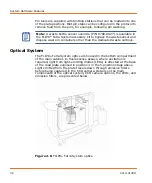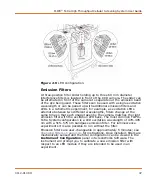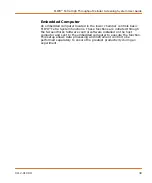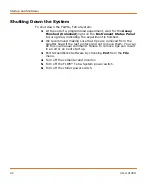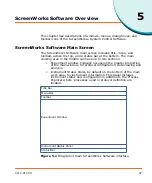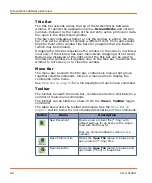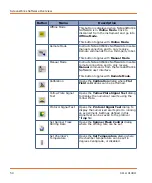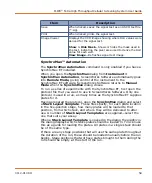
Software Installation
46
0112-0109 H
Offline (Desktop) Mode
When ScreenWorks Software is launched in Offline mode, you can
configure the following hardware options:
•
Camera Type
•
Excitation Wavelengths
•
Emission Wavelengths
•
Pipettor (automatically selects matching tip washer type)
•
Cell suspension
•
TETRAcycler
™
(automatically sets bar code reader status)
Uninstalling ScreenWorks Software
1.
Click
Start > Control Panel
and double-click on
Add or
Remove Programs
from the Windows
Control Panel
dialog.
2.
Find
ScreenWorks
in the list of currently installed programs
and click
Remove
to initiate the uninstall process.
3.
Click
Next
when prompted to
Uninstall
ScreenWorks.
4.
In the
Configuring the ScreenWorks installation
dialog,
Click
Next
.
When the installation is complete, the
Completing the
installation process
dialog appears. Click
Finish
to exit the
wizard.
Note:
Regardless of the start-up mode, pipettor head and tip washer
type must always match. If the TETRAcycler is installed, it is assumed
the bar code reader is also connected.
Summary of Contents for FLIPR Tetra
Page 1: ...FLIPR Tetra High Throughput Cellular Screening System User Guide 0112 0109 H December 2011...
Page 12: ...Contents 12 0112 0109 H...
Page 16: ...System Overview 16 0112 0109 H...
Page 40: ...System Hardware Features 40 0112 0109 H...
Page 148: ...Exchanging Hardware 148 0112 0109 H...
Page 156: ...Calibration and Signal Test 156 0112 0109 H...
Page 196: ...Running an Experiment 196 0112 0109 H...
Page 232: ...Robotic Integration 232 0112 0109 H The following drawings illustrate these requirements...
Page 282: ...Data Processing Algorithms 282 0112 0109 H...
Page 294: ...Consumables and Accessories 294 0112 0109 H...
Page 298: ...Using AquaMax Sterilant 298 0112 0109 H...
Page 302: ...Electromagnetic Compatibility EMC 302 0112 0109 H...

